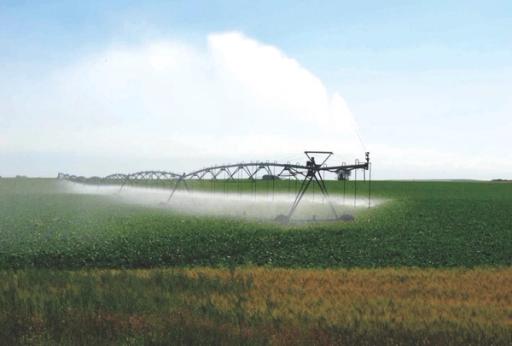March 10, 2019
U of L Study a First in Looking at the Use of Precision Agriculture in Irrigation Farming in Alberta

Given the importance of irrigation to the southern Alberta economy, two University of Lethbridge economists wanted to know if agricultural producers who irrigate are using precision agriculture technologies.
Drs. Lorraine and Chris Nicol have conducted the first study in Alberta examining the adoption of precision agriculture in irrigation farming. Their survey shows users are reducing farm inputs and seeing positive economic benefits as a result.
Last fall, they conducted a survey of irrigators in the Taber Irrigation District (TID) to find out the extent to which precision agriculture technologies are being adopted, the types of tools being used and the satisfaction with the technologies. They also looked at those who didn’t use precision agriculture technologies and their reasons for not adopting. Twenty-seven percent of irrigators in the TID participated in the survey.
“Based on the data collected, 81 percent of irrigators have adopted some form of precision agriculture, an average of five technologies per irrigator. Overall, those who have adopted are very satisfied with the technologies and almost all plan on using even more technologies in the future” says Lorraine. “Among non-adopters, most said their operations were too small to justify the high investment costs.”
Precision agriculture involves parsing fields into small parcels based on variability, allowing more precise application of irrigation water, fertilizer, chemicals and seed, compared to conventional methods. The study identified 20 technologies including auto-steering equipment, variable rate fertilizer and irrigation application, soil-moisture monitoring, terrain mapping and analysis, unmanned aerial vehicle mapping, satellite imagery and various data management tools, for example.
“Precision agriculture has fundamentally changed the way farming is done and it has the potential to reduce costs and increase profits for farmers. Precision agriculture is also critical for sustainable agriculture. Using less fertilizer and less irrigation water, for example, helps lessen run-off and conserve water so it’s also better for the environment,” says Chris.
The TID, one of 13 irrigation districts in the region, has one of the highest concentrations of specialty crops, including potatoes, sugar beets, canola seed, beans, peas, corn, sunflowers and onions. These inputs are vital to processing industries as well as the confined feedlot industry in the region. The TID consists of 115 to 120 irrigation producers who irrigate more than 80,000 acres. Its irrigation infrastructure also supplies water to several communities and many individuals.
The survey showed under precision agriculture, crop yields have increased an average 20 per cent and yearly crop quality has increased by an average of 16 per cent. Yearly reductions in irrigation water, fertilizer, herbicides and pesticides have ranged between 14 and 24 per cent.
Non-adopters consist entirely of farms less than 2,000 acres. Those irrigators generally cited the smaller size of their operations, high investment costs and incompatibility of machines as the main reasons for not adopting.
“These results suggest irrigators are embracing precision agriculture and experiencing the benefits,” says Lorraine. “This also has positive implications for economic and community development, as well as environmental stewardship.”
…..
The study found:
- 81% of irrigators have adopted some form of precision agriculture;
- yearly crop yields have increased an average 20% and yearly crop quality has increased an average 16%;
- yearly reductions in irrigation water, fertilizer, herbicides and pesticides have ranged from 14% to 24%;
- precision agriculture technologies are being applied largely to specialty crops;
- for 85% of adopters, precision agriculture has affected their overall farm management approach;
- 89% of adopters are highly satisfied with the technology;
- 92% of adopters plan to adopt additional precision agriculture technologies in the future;
- non-adopters indicate small operations, high investment costs, and incompatibility of machines are the main reasons for their non-adoption of precision agriculture technologies.
Read the full report here. The study was funded by a grant from the Alberta Real Estate Foundation.
Similar News


